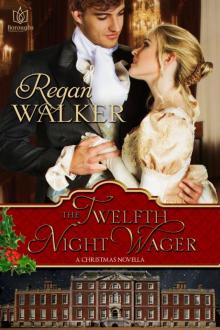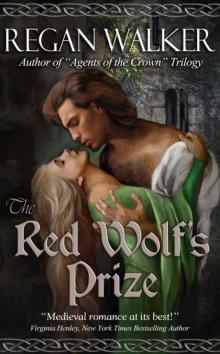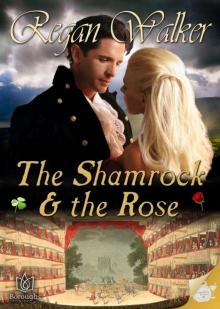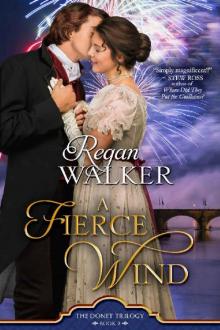- Home
- Regan Walker
A Secret Scottish Christmas (Agents of the Crown Book 4)
A Secret Scottish Christmas (Agents of the Crown Book 4) Read online
Table of Contents
Prologue
Chapter 1
Chapter 2
Chapter 3
Chapter 4
Chapter 5
Chapter 6
Chapter 7
Chapter 8
Chapter 9
Chapter 10
Chapter 11
Chapter 12
Chapter 13
Chapter 14
Chapter 15
Chapter 16
Chapter 17
Chapter 18
Chapter 19
Chapter 20
Chapter 21
Chapter 22
Chapter 23
A Secret Scottish Christmas
This is a work of fiction. Names, characters, places and incidents either are the product of the author’s imagination or are used fictitiously. Any resemblance to actual events, locales, business establishments or persons, living or dead, is coincidental.
A SECRET SCOTTISH CHRISTMAS
Copyright © 2017 Regan Walker
All rights reserved. Unless specifically noted, no part of this publication may be reproduced, scanned, stored in a retrieval system or transmitted in any form or by any means, electronic, mechanical, photocopying, recording, or otherwise, known or hereinafter invented, without the express written permission of the author. The scanning, uploading and distribution of this book via the Internet or by any other means without the permission of the author is illegal and punishable by law. Participation in the piracy of copyrighted materials violates the author’s rights.
Ebook ISBN: 978-0-9976567-1-8
Kindle Edition
Praise For Regan Walker’s Work:
“Ms. Walker has the rare ability to make you forget you are reading a book. The characters become real, the modern world fades away, and all that is left is the intrigue, drama, and romance.”
—Straight from the Library
“The writing is excellent, the research impeccable, and the love story is epic. You can’t ask for more than that.”
—The Book Review
“Regan Walker is a master of her craft. Her novels instantly draw you in, keep you reading and leave you with a smile on your face.”
—Good Friends, Good Books
“…an example of ‘how to’ in good story building… a multilayered novel adding depth and yearning.”
—InD’Tale Magazine
“Spellbinding and Expertly Crafted”… “The path to true love is never easy, yet Regan Walker leads the reader to an entertaining, realistic and worthy HEA. Walker’s characters are complex and well-rounded and, in her hands, real historical figures merge seamlessly with those from her imagination.”
—A Reader’s Review
“Walker stuns with her gift for storytelling, magically entwining historic fact and fiction to create a thought-provoking, sensual romance, one that will stay with you.”
—Chicks, Rogues & Scandals
“Walker’s detailed historical research enhances the time and place of the story without losing sight of what is essential to a romance: chemistry between the leads and hope for the future.”
—Publisher’s Weekly
“… an enthralling story.”
—RT Book Reviews
Acknowledgements
My gratitude goes to photographer Kenny Muir for allowing me to use his beautiful photograph of Dunnottar Castle, dressed in winter’s splendor, for my cover. A special thank you also goes to those who helped me make this novel historically authentic: Simon Cruickshank, the proprietor of The Ship Inn in Stonehaven, built in 1771, who confirmed that the inn had sufficient rooms in 1819 to accommodate William Stephen’s guests; and Paul at Big Game Indicating Dogs, who read my scene of the deer stalking with Ailie’s setters and assured me it could well have happened that way.
In addition, I must thank my beta readers for their contributions, especially Liette Bougie and Dr. Chari Wessel, whose contributions were invaluable.
Contents
Title Page
Copyright
Praise for Regan’s work
Acknowledgements
Characters of Note
Prologue
Chapter 1
Chapter 2
Chapter 3
Chapter 4
Chapter 5
Chapter 6
Chapter 7
Chapter 8
Chapter 9
Chapter 10
Chapter 11
Chapter 12
Chapter 13
Chapter 14
Chapter 15
Chapter 16
Chapter 17
Chapter 18
Chapter 19
Chapter 20
Chapter 21
Chapter 22
Chapter 23
Author’s Note
Author Bio
Books by Regan Walker
Characters of Note
(with their stories noted)
Aileen (“Ailie”) Stephen
Nash Etienne Powell, twin brother of Robbie
Robert (“Robbie) Pierre Powell, twin brother of Nash
William Stephen, Scottish shipbuilder in Arbroath, and Lady Emily Stephen (from The Holly & The Thistle)
Claire Powell, mother of the Powell sons and wife to Captain Simon Powell (from To Tame the Wind)
Hugh, the Marquess of Ormond, and Mary, Lady Ormond (from Racing with the Wind)
Captain Nicholas Powell and Tara Powell (from Wind Raven)
Sir Martin Powell and Lady Katherine (“Kit”) Powell (from Against the Wind)
Muriel, Dowager Countess of Claremont (who appears in many of my stories)
Captain Dougal Anderson of William Stephen and Sons, shipmaster
Mrs. Harriot Platt, Lady Claremont’s cook from London
Martha McBride, William and Emily’s cook in Arbroath
Rhona, Ailie’s maid
Angus Ramsay, maternal grandfather to Ailie and William in Stonehaven
George Kinloch, the gentleman farmer from Dundee, dubbed the “Radical Laird”
There are no secrets that time does not reveal.
—Jean Racine
Prologue
St Peter’s Field, Manchester, England
16 August 1819
The crowd surged around Nash like a living thing. Voices of children mingled with those of their parents anxiously awaiting the man they believed would give eloquent voice to their long-ignored cries for reform.
Unmindful of the smoke from the city’s factories marring the blue of the midday sky, thousands had flocked to the vast green field. Mothers wore their Sunday best, some carried babes in arms. Their presence only added to Nash’s fears.
The conversations he and his twin brother Robbie had overheard in Manchester’s taverns had educated them to the people’s hope that such a large gathering would rouse the government to act. They wanted representation in Parliament and relief from the heavy taxes that took bread from the mouths of their children.
Nash had seen for himself the hunger and sickness that stalked the overcrowded city like a destroying angel, claiming lives old and young.
Manchester’s huge population lacked even a single Member of Parliament while some villages with a dozen people and a few cows had their own MP, a situation that kept votes in the hands of the landed few.
Jostled by the crowd, Nash took a step back, shaking his head. He doubted the workers in Manchester would see their hopes realized. The political climate in England turned a deaf ear to cries for reform. Fearful the lower classes would rise up like those across the Channel, the governm
ent’s mood was one of suspicion, even fear.
The Home Secretary Lord Sidmouth had sent Nash and Robbie to Manchester to spy on those “fomenting rebellion”. But in the days they’d been here, they’d uncovered no signs of revolt. As far as Nash could determine, none of the men in today’s crowd bore arms. They carried only the meager food they had to sustain their families for the day.
What man brought his children to an armed rebellion?
Shifting his gaze to the right, Nash caught a glimpse of Robbie’s head of nut-brown hair rising above the crowd some yards away. His brother’s furrowed brow shouted the foreboding they both felt. As twins, they often shared emotions, a benefit to them as spies.
Nash’s unease grew, his stomach twisting in knots, as he thought of the forces mustered a few streets away: six troops of the 15th Hussars cavalry and seven companies of infantry, to which had been added the Manchester Yeomanry.
Over one thousand armed men stood ready to subdue any violence offered by the unarmed crowd.
Convinced this would be an insurrection, Sidmouth wanted to make a point. But did the Home Secretary intend to do more? Nash feared Sidmouth wanted blood. Did his plan, undisclosed to Nash and Robbie, include teaching the people of Manchester a terrifying lesson?
Murmurs spread through the crowd as the man for whom they had patiently waited finally made his way to the wooden platform. Henry Hunt, with his distinguished head of gray hair, stood ready to address the people.
Nash glanced at his pocket watch, noting the time: half past one.
From the other side of the field, a band struck up a rousing “God Save the King” and, for respect owing their monarch, the men took off their hats. Nash, too, removed his cap, setting it back on his head when the music stopped.
With eager anticipation, the people surged forward, straining to hear Hunt’s first words.
Suddenly, on the edge of the field, not far from where Nash stood, the Manchester Yeomanry appeared. Their blue uniforms and tall hats trimmed in gold made a flashy contrast to the common dress of the people.
Nash desperately wanted to believe the soldiers were there merely to assure order. The people must have believed it was so because they received the yeomen with shouts of goodwill. But the hard expressions on the soldiers’ faces told Nash they were there for an entirely different purpose.
Without warning, the yeomen raised their sabers and galloped into the crowd.
Horrified, Nash watched as the cavalry, reeling in their saddles, hewed their way through the defenseless heads and naked hands of the people. Heedlessly, they chopped off limbs until their blades dripped blood, leaving gaping wounds and blood-spattered clothes in their wake.
The thronging masses panicked, shrieking in fear and protest. Eyes wild, men, women and children screamed and tried to run. Trapped by the crowd, there was nowhere to go.
Heart-rending cries from women and children filled the air, piercing Nash to his soul.
Ignoring the shrieks and groans, the uncaring cavalry plunged forward.
Catching Robbie’s eye, Nash pushed his way through the fleeing crowd, heading toward the nearest yeoman to try to stop the mêlée. Before he could reach him, the soldier raised his saber and struck a woman in the head with the flat of his blade.
She plummeted to the ground. Her children fell to their knees beside her wailing, “Mama!”
Hot fury burned in Nash’s chest, as he raced to the yeoman. “These people are unarmed!” he shouted above the din. “Drop your sword! Forbear!”
The yeoman, slurring his words beyond understanding, swung his blade at Nash.
The blow hit him on the side of the head. Stunned, he crumpled to the grass.
Blackness closed around him as he heard Robbie shout, “Leave off, you fool! He is Sidmouth’s man!”
Chapter 1
Arbroath, Forfarshire, Scotland
December 1819
Aileen Stephen drew her blue tartan shawl tightly around her, burying her cold fingers in the soft wool as she stared out the window, watching snow fall in great lumps on the shipyard. In her mind, she saw the face that had come to her in a dream the night before. A dark-haired man of handsome visage who seemed to see into her very soul.
A man she did not know.
The stove in the shipyard office warmed her backside, but the air next to the large window carried winter’s chill. “It’s snowing again, Will. Soon, the entire yard will be buried.”
As she watched, the snow covered the decks, rigging and masts of the schooners docked in front of the company’s offices, making them appear like fairy ships. Beyond the snow-covered schooners, the North Sea showed its drab face, like an old sailor’s, gray and sullen.
Behind her, she heard her brother scratching a line into his ledger. “Aye, no work outside today, but the lads are still working on the new schooner in the main shop and I’ve got others cutting sails. They’ll have the week before Hogmanay and the New Year to spend with their families, so they’ll not mind a bit of work before then. ’Sides, I’ve made sure the stove fires are stoked and fed with coal.”
She turned away from the window and reached her hands toward the heat from the office stove, her ginger hair falling over one shoulder. Opening the door of the stove, she added a log and breathed in the sweet smell of the burning birch. “When are your guests arriving from London?”
Will looked up from his ledger. “They may be English, Ailie, but they’re our guests and Emily’s friends, so do be kind to them.” He gave her one of his smiles that never failed to soften her ire. As older brothers went, he was more than tolerable.
“Haven’t I been practicing the songs to play for them?”
“Aye, you have. They will love the music. I want Emily’s first Christmas away from London to be a special time of celebration, one she will always remember.” He leaned back in his chair and began to chew the end of his cedar wood pencil, seeming to contemplate the unknowable as only Will could. In truth, Ailie loved her English sister-in-law of one year and would be happy to please her, for Emily had made Will content.
“So, when do they arrive?”
Will twisted his pencil. “That depends on the weather, of course. I sent the Albatross a week ago. Allowing for time to load and take on provisions, they should be leaving London about now.”
“Might I know who’s coming?”
Her brother set his pencil down, crossed his arms over his chest and leaned back in his chair. His mouth quirked up in a grin. “Muriel, Lady Claremont, Emily’s dearest friend. She’s an older dowager and quite respected in London Society.” He smiled as if remembering something. “Loves feathers and parties. You’ll like her.” Uncrossing his arms, he picked up his pencil. “I should probably warn you, though. Muriel dabbles in matchmaking. ’Twas the countess who picked me for Emily.”
Ailie considered the possibility of an aging English countess who dabbled in matchmaking being one of their guests. Lady Claremont would be hard pressed to find candidates for her efforts in Arbroath. Ailie’s younger brothers and unmarried cousins were all in Aberdeen, where her father and uncle ran the successful shipbuilding concern Alexander Stephen & Sons.
“Who is the countess bringing with her?” Someone for Ailie to talk to, she hoped.
“Ormond and his wife, Mary, of course.”
Ailie had never met Lord Ormond, one of her brother’s Cambridge friends, but Will had spoken often of him and his young wife, both English aristocrats. Emily, who knew the pair, reported they were great lovers of horseflesh and raised thoroughbreds for racing.
“The Ormonds attended our wedding in London last December. The marchioness is younger than you, yet she has already managed to give Ormond his heir and a spare.”
“Is that a hint?” Will didn’t need to tell her she had reached the age of twenty-four and was still unwed.
“Nay, Ailie. I know I sometimes tease you but if you desire to never wed, though Mother will be appalled, you will always have a home with Emily a
nd me. It’s just that…”
“What?”
“I would see you find the happiness I have found with Emily. Kindred souls and all that.”
“’Tis rare, Will, especially for a woman who would not confine herself to the home.”
“I know, but at least our guests will provide some interesting conversation that should appeal. Ormond wrote to say he’s bringing his friends from Powell and Sons.” At her puzzled expression, he added, “It’s a London shipping company. Every man in the family is a shipmaster—and there are five of them.” Will waggled his chestnut brows. “Ormond thinks we’ll have much to talk about since the Powells buy ships and we build them.”
She chuckled. “That will make for interesting discourse.” Ailie’s whole world revolved around shipbuilding. It would always be her preference to speak of ships rather than London gossip or Scotland’s unhappy textile workers. She had just turned nineteen when Will returned from the war in France and urged her to leave Aberdeen to join him in his new venture in Arbroath.
She went back to her desk and picked up the drawing she’d been working on. “So, how many are coming?”
Her brother reached for the letter he had set aside. “According to Ormond, their children are spending Christmas with the grandparents. So, in addition to the Ormonds and the dowager countess, all four of the Powell brothers have accepted the invitation, the two who are married bringing their wives. Nine guests in all.”
“Nine?” Her eyebrows rose. “’Tis fortunate you added that wing to the house after you married Emily.” Will had already possessed a grand house on the hill overlooking the shipyard when he took his English bride. In the year that followed, it had become a sprawling estate, complete with an orangery for Emily, whose constitution favored a warmer clime.
Will grinned. “I had to enlarge the house. I did not change the company’s name to William Stephen and Sons to remain childless. Emily and I expect to have many bairns. Come spring, Lord willing, we shall have the first one. Perhaps a braw lad with my auburn hair and brown eyes.”

 Summer Warrior (The Clan Donald Saga Book 1)
Summer Warrior (The Clan Donald Saga Book 1) Echo in the Wind
Echo in the Wind Once Upon a Christmas Past
Once Upon a Christmas Past A Secret Scottish Christmas (Agents of the Crown Book 4)
A Secret Scottish Christmas (Agents of the Crown Book 4) The Holly and the Thistle
The Holly and the Thistle Racing with the Wind (Agents of the Crown)
Racing with the Wind (Agents of the Crown) Wind Raven (Agents of the Crown)
Wind Raven (Agents of the Crown) Rebel Warrior (Medieval Warriors #3)
Rebel Warrior (Medieval Warriors #3) King's Knight (Medieval Warriors Book 4)
King's Knight (Medieval Warriors Book 4) The Twelfth Night Wager
The Twelfth Night Wager The Red Wolf's Prize
The Red Wolf's Prize The Shamrock & the Rose
The Shamrock & the Rose A Fierce Wind (Donet Trilogy Book 3)
A Fierce Wind (Donet Trilogy Book 3) Against the Wind (Agents of the Crown Book 2)
Against the Wind (Agents of the Crown Book 2)